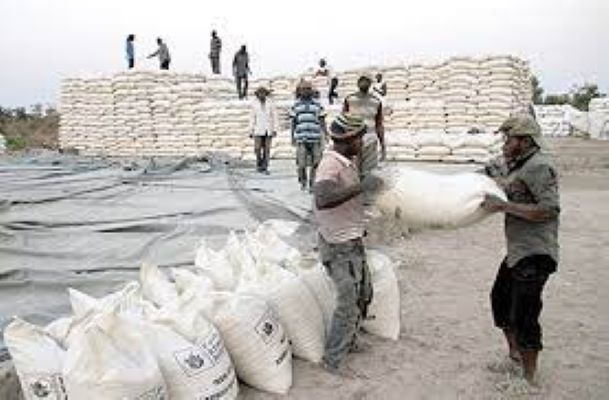Purchases of maize and other crops by Zambia’s food Reserve Agency in the 2022 marketing season remain on course to attain the country’s food security after purchasing over 130 million metric tons of maize in the marketing season amid demand by regional neighbors facing food shortages.
Zambia had by 25 August this year procured 133,019.25 metric tons of maize against the projected minimum of 170,000 metric tons, and soya beans secured was 35,232.30 metric tons against a Minimum of 1,500 metric tons.
Purchases for paddy rice amounted to 89.84 metric tons against 1,000 metric tons projected to be procured from various small-holder farmers in the country by 31 August.
The secured maize represented 78% achieved, 100 % achieved for soya beans with 9% achieved for paddy rice, the country’s Food Reserve Agency (FRA)’s spokesperson, Manyando Luywa says in a statement.
The agency had early this year and under the law announced its plan for purchases of designated agricultural commodities during the 2022/23 Marketing Season from.
It was planned that at least 600 satellite depots shall be opened in 106 districts which commenced June 1 and were planned to close a week after.
This directive was subject to market dynamics. Farmers were tasked to deliver their crops to the designated satellite depots which were being operated by the agency’s representatives as buying agents.
Farmers were advised to ensure they were issued with Produce Received and Certification Notes (PRCN) at the satellite depot.
Prior to the purchase of the various crops by FRA, the inspection was undertaken to assess the crop for quality and quantity before being issued appropriate documentation evidencing the transaction; and Crop deliveries were confirmed by FRA representatives at main holding depots before payment was made.
This criterion formed part of the procedure to avoid delays in the transactions.
President Hakainde Hichilema and his minister of agriculture Reuben Mtolo had tasked the farmers to commit themselves to ensure large hectare of arable land was maximized and ensure the country was food secured.
This was assured amid increasing demand from Zambia’s neighbors and East African countries that lost much of their crops because of climatic changes and COVID-19 that affected agriculture production.
Zambia, the Government maintained would continue being food-secure despite the ravaging storms that have washed away some crop fields.
The country remains certain of stocking adequate food to meet the requirements should the farming season(s) become vulnerable to floods.
A tropical storm, named Ana, had last year devastated vast areas of Mozambique, Madagascar, and Malawi, triggering projections of significantly reduced crop production.
Zambia had remained alert over the tropical storm and is not overly concerned about the availability of food.
“We are food-secure as a country. We have enough stocks in our reserve to last us this season. People should not panic with minister Mtolo remaining hopeful of overcoming the storm despite unpredictable weather conditions.
“Yes, we may not have control over the tropical storm, but we are on high alert,” DR. Congo is among other Zambia’s regional neighbors and recognizes the country’s strategic market for the latter.
Food security and correct nutrition are key to Africa’s most fundamental challenges and should be harnessed to ensure the continent attains the projected Sustainable Development Goals, noted the United Nations (UN) Office for the Coordination of Humanitarian Affairs, (OCHA).
In its report, the UN body, while fearing that Africa may fail to meet the Sustainable Development Goal (SDG) 2 striving to end hunger and ensure access by all people to safe, nutritious, and sufficient food all year round, and also to end all forms of malnutrition says more needs to be done to ensure food security.
In a 2021 combined report by the African Union (AU), UN Economic Commission for Africa (ECA), and Food and Agriculture Organisation (FAO) on Africa Regional Overview of Food Security and Nutrition, OCHA notes from recent estimates that much of the 281.6 million people on the continent, more than one-fifth of the population, and faced hunger in 2020.
This status represents 46.3 million more than a year earlier. It feared in the absence of strategic food reserves, the continent was at the mercy of various factors, including Post Harvest Losses, among others that could derail plans to generate enough food./








